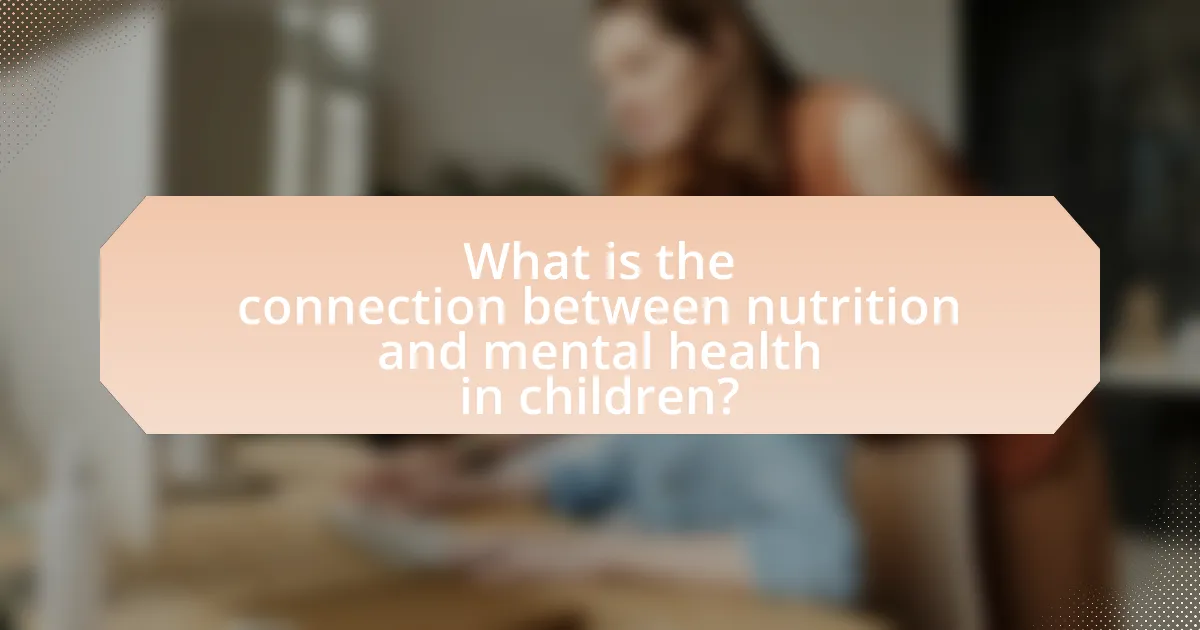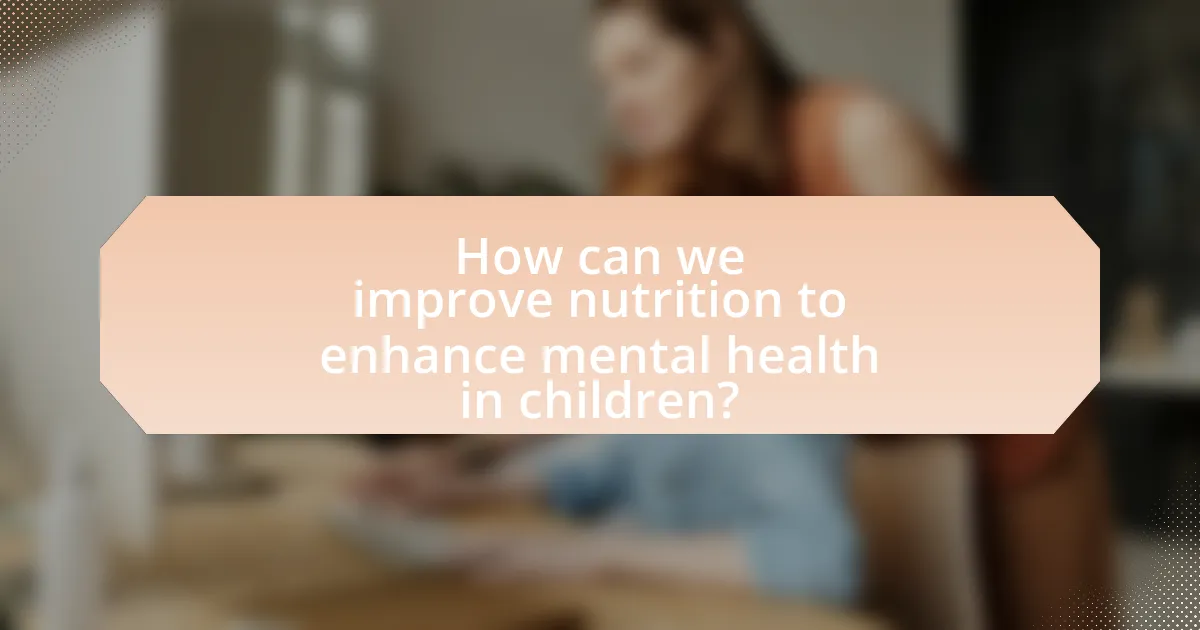The article examines the critical connection between nutrition and mental health in children, highlighting how a balanced diet rich in essential nutrients supports brain development and emotional well-being. It discusses specific nutrients vital for mental health, such as omega-3 fatty acids, vitamins, and minerals, and outlines the detrimental effects of nutritional deficiencies on children’s emotional stability, including increased risks of anxiety and depression. The article emphasizes the role of parents and educators in promoting healthy dietary habits and provides strategies for improving children’s nutrition to enhance their mental health outcomes. Additionally, it addresses common mental health issues related to poor nutrition, such as ADHD and autism spectrum disorders, and offers practical recommendations for fostering better eating habits among children.

What is the connection between nutrition and mental health in children?
Nutrition significantly influences mental health in children, as a balanced diet provides essential nutrients that support brain development and function. Research indicates that deficiencies in key nutrients, such as omega-3 fatty acids, vitamins, and minerals, can lead to increased risks of anxiety, depression, and behavioral issues. For instance, a study published in the journal “Nutritional Neuroscience” found that children with higher intakes of fruits, vegetables, and omega-3s exhibited better emotional well-being and cognitive performance. This evidence underscores the critical role of nutrition in shaping mental health outcomes in children.
How does nutrition influence mental health in children?
Nutrition significantly influences mental health in children by affecting brain development and function. A balanced diet rich in essential nutrients, such as omega-3 fatty acids, vitamins, and minerals, supports cognitive processes and emotional regulation. Research indicates that deficiencies in nutrients like iron, zinc, and omega-3s are linked to increased risks of anxiety and depression in children. For instance, a study published in the journal “Nutrients” found that children with higher intakes of fruits, vegetables, and omega-3 fatty acids exhibited better mental health outcomes compared to those with poor dietary habits. This evidence underscores the critical role of nutrition in shaping mental well-being during childhood.
What specific nutrients are essential for children’s mental health?
Essential nutrients for children’s mental health include omega-3 fatty acids, B vitamins, vitamin D, iron, zinc, and magnesium. Omega-3 fatty acids, found in fish and flaxseeds, are crucial for brain development and function, with studies indicating that they can reduce symptoms of depression and anxiety in children. B vitamins, particularly B6, B12, and folate, play a vital role in neurotransmitter synthesis, impacting mood regulation. Vitamin D, obtained from sunlight and fortified foods, is linked to cognitive function and emotional well-being, with deficiencies associated with increased risk of mood disorders. Iron is essential for oxygen transport in the brain, and its deficiency can lead to cognitive impairments. Zinc contributes to neurogenesis and synaptic function, while magnesium is involved in regulating neurotransmitters and has been shown to alleviate anxiety symptoms. These nutrients collectively support optimal brain health and emotional stability in children.
How do deficiencies in nutrition affect children’s emotional well-being?
Deficiencies in nutrition significantly impact children’s emotional well-being by increasing the risk of anxiety, depression, and behavioral issues. Research indicates that inadequate intake of essential nutrients, such as omega-3 fatty acids, vitamins, and minerals, can lead to alterations in brain chemistry and function, which are crucial for mood regulation. For instance, a study published in the journal “Nutrients” found that children with lower levels of omega-3 fatty acids exhibited higher levels of emotional distress and behavioral problems. Furthermore, deficiencies in iron and zinc have been linked to increased irritability and mood swings in children, as these minerals play vital roles in neurotransmitter function. Thus, ensuring proper nutrition is essential for maintaining emotional health in children.
Why is understanding this connection important for parents and educators?
Understanding the connection between nutrition and mental health is crucial for parents and educators because it directly influences children’s cognitive development and emotional well-being. Research indicates that a balanced diet rich in essential nutrients can enhance brain function, improve mood, and reduce the risk of mental health issues such as anxiety and depression. For instance, a study published in the journal “Nutrients” found that children who consume diets high in fruits, vegetables, and omega-3 fatty acids exhibit better mental health outcomes compared to those with poor dietary habits. This knowledge empowers parents and educators to make informed decisions regarding children’s diets, fostering environments that support both their physical and mental health.
What role do parents play in shaping children’s dietary habits?
Parents play a crucial role in shaping children’s dietary habits by influencing food choices, meal patterns, and attitudes towards nutrition. Research indicates that children often model their eating behaviors after their parents, making parental dietary practices a significant factor in children’s nutrition. For instance, a study published in the Journal of Nutrition Education and Behavior found that children whose parents regularly consumed fruits and vegetables were more likely to have higher intake levels of these foods themselves. Additionally, parents who establish structured meal times and provide a variety of healthy food options contribute to better dietary habits in their children, promoting overall health and well-being.
How can educators support healthy nutrition in schools?
Educators can support healthy nutrition in schools by implementing comprehensive nutrition education programs and promoting healthy food choices in the cafeteria. Research indicates that nutrition education can significantly improve students’ dietary habits, leading to better mental health outcomes. For instance, a study published in the Journal of School Health found that students who participated in nutrition education programs showed increased knowledge about healthy eating and made healthier food choices. Additionally, schools can collaborate with local farms to provide fresh produce, ensuring that students have access to nutritious meals, which is crucial for cognitive function and emotional well-being.

What are the common mental health issues in children related to nutrition?
Common mental health issues in children related to nutrition include anxiety, depression, and attention-deficit/hyperactivity disorder (ADHD). Research indicates that poor nutrition, characterized by high sugar intake and low consumption of fruits and vegetables, can exacerbate these conditions. For instance, a study published in the journal “Nutrients” found that children with diets high in processed foods are more likely to experience symptoms of anxiety and depression. Additionally, deficiencies in essential nutrients like omega-3 fatty acids and vitamins B and D have been linked to increased risks of ADHD and mood disorders. These findings underscore the significant impact of nutrition on children’s mental health.
How does poor nutrition contribute to anxiety and depression in children?
Poor nutrition significantly contributes to anxiety and depression in children by affecting brain chemistry and overall health. Nutritional deficiencies, particularly in essential fatty acids, vitamins, and minerals, can impair neurotransmitter function, leading to mood disorders. For instance, studies have shown that low levels of omega-3 fatty acids are linked to increased rates of depression and anxiety in children. Additionally, a diet high in processed foods and sugars can lead to inflammation and oxidative stress, both of which are associated with mental health issues. Research published in the journal “Nutrients” indicates that children with poor dietary habits are more likely to experience symptoms of anxiety and depression, highlighting the critical role of nutrition in mental health.
What are the signs of anxiety and depression linked to dietary habits?
Signs of anxiety and depression linked to dietary habits include changes in appetite, such as overeating or undereating, and cravings for unhealthy foods. These dietary changes can lead to nutritional deficiencies, which are associated with mood disorders. For instance, low levels of omega-3 fatty acids, often found in fish, have been linked to increased symptoms of depression and anxiety in children. Additionally, high sugar intake can exacerbate mood swings and anxiety levels, as evidenced by research indicating that diets high in refined sugars are correlated with a higher risk of developing mood disorders.
How can improving nutrition alleviate these mental health issues?
Improving nutrition can alleviate mental health issues in children by providing essential nutrients that support brain function and emotional regulation. Nutrients such as omega-3 fatty acids, vitamins, and minerals play a critical role in neurotransmitter synthesis and overall brain health. For instance, a study published in the journal “Nutritional Neuroscience” found that children with higher omega-3 intake exhibited lower levels of anxiety and depression. Additionally, a balanced diet rich in fruits, vegetables, and whole grains has been linked to improved mood and cognitive function, as evidenced by research from the “Journal of Affective Disorders,” which showed that dietary patterns high in these foods correlate with reduced symptoms of depression in children.
What other mental health disorders are influenced by nutrition?
Nutrition influences several mental health disorders, including depression, anxiety, and attention-deficit/hyperactivity disorder (ADHD). Research indicates that diets high in processed foods and low in essential nutrients can exacerbate symptoms of these disorders. For instance, a study published in the journal “Nutritional Neuroscience” found that individuals with depression often have lower levels of omega-3 fatty acids and vitamins B12 and D, which are crucial for brain health. Additionally, a systematic review in “Psychiatry Research” highlighted that poor dietary patterns are associated with increased anxiety levels in both children and adults. These findings underscore the significant role nutrition plays in the management and prevention of various mental health disorders.
How does nutrition impact attention deficit hyperactivity disorder (ADHD)?
Nutrition significantly impacts attention deficit hyperactivity disorder (ADHD) by influencing brain function and behavior. Specific nutrients, such as omega-3 fatty acids, zinc, iron, and certain vitamins, have been shown to play a role in managing ADHD symptoms. For instance, a study published in the journal “Nutritional Neuroscience” found that children with ADHD often have lower levels of omega-3 fatty acids, which are crucial for cognitive function and emotional regulation. Additionally, deficiencies in micronutrients like zinc and iron have been linked to increased hyperactivity and impulsivity in children. Therefore, a balanced diet rich in these essential nutrients can help mitigate ADHD symptoms and improve overall mental health in affected children.
What is the relationship between nutrition and autism spectrum disorders?
The relationship between nutrition and autism spectrum disorders (ASD) is significant, as certain dietary patterns and nutrient deficiencies can influence the severity of symptoms. Research indicates that children with ASD may benefit from specific dietary interventions, such as gluten-free or casein-free diets, which some studies suggest can lead to improvements in behavior and social skills. For instance, a study published in the Journal of Autism and Developmental Disorders found that dietary changes resulted in reduced gastrointestinal symptoms and improved behavioral outcomes in children with ASD. Additionally, deficiencies in omega-3 fatty acids, vitamins, and minerals have been associated with increased severity of ASD symptoms, highlighting the importance of a balanced diet for managing the condition.

How can we improve nutrition to enhance mental health in children?
Improving nutrition to enhance mental health in children can be achieved by increasing the intake of omega-3 fatty acids, fruits, vegetables, and whole grains while reducing processed foods and sugars. Research indicates that diets rich in omega-3s, found in fish and flaxseeds, are linked to lower rates of depression and anxiety in children. A study published in the journal “Nutrients” by Li et al. (2020) found that higher consumption of fruits and vegetables is associated with improved mood and cognitive function in children. Additionally, whole grains provide essential nutrients that support brain health, while minimizing processed foods can reduce inflammation and stabilize mood.
What dietary changes can promote better mental health in children?
Incorporating a diet rich in omega-3 fatty acids, whole grains, fruits, and vegetables can promote better mental health in children. Omega-3 fatty acids, found in fish like salmon and walnuts, are linked to improved cognitive function and reduced symptoms of depression. Whole grains provide steady energy and support brain health, while fruits and vegetables supply essential vitamins and antioxidants that combat oxidative stress, which can negatively impact mental health. Research published in the journal “Nutrients” by Jacka et al. (2017) indicates that a diet high in these nutrients is associated with lower rates of anxiety and depression in children.
Which foods should be included in a child’s diet for optimal mental health?
A child’s diet for optimal mental health should include foods rich in omega-3 fatty acids, whole grains, fruits, vegetables, lean proteins, and probiotics. Omega-3 fatty acids, found in fish like salmon and walnuts, are essential for brain development and function, as studies indicate they can improve mood and cognitive performance. Whole grains provide a steady supply of glucose, which is crucial for brain energy, while fruits and vegetables supply vital vitamins and antioxidants that support overall brain health. Lean proteins, such as chicken and legumes, contribute amino acids necessary for neurotransmitter production, influencing mood regulation. Probiotics, found in yogurt and fermented foods, have been linked to improved mental health by promoting gut health, which is increasingly recognized as connected to brain function.
What foods should be avoided to prevent negative mental health effects?
To prevent negative mental health effects, foods high in refined sugars, trans fats, and artificial additives should be avoided. Research indicates that diets rich in refined sugars can lead to increased symptoms of anxiety and depression, as evidenced by a study published in the American Journal of Clinical Nutrition, which found a correlation between high sugar intake and mood disorders. Additionally, trans fats, commonly found in processed foods, have been linked to cognitive decline and increased risk of depression, as noted in a study from the Journal of Clinical Psychiatry. Lastly, artificial additives, such as food colorings and preservatives, have been associated with behavioral issues in children, as highlighted in research from the University of Southampton.
How can parents and caregivers implement these dietary changes effectively?
Parents and caregivers can implement dietary changes effectively by gradually introducing nutrient-rich foods while involving children in meal planning and preparation. This approach fosters a positive attitude towards healthy eating and encourages children to try new foods. Research indicates that children are more likely to accept new foods when they participate in the cooking process, as highlighted in a study published in the Journal of Nutrition Education and Behavior, which found that children who helped prepare meals were more willing to taste and consume healthier options. Additionally, establishing regular meal times and creating a supportive eating environment can reinforce these dietary changes, promoting consistency and positive eating habits.
What strategies can help children develop healthy eating habits?
To help children develop healthy eating habits, parents and caregivers can implement strategies such as modeling healthy eating behaviors, involving children in meal preparation, and providing a variety of nutritious foods. Research indicates that children are more likely to adopt healthy eating habits when they observe adults making nutritious choices, as demonstrated in a study published in the Journal of Nutrition Education and Behavior, which found that parental influence significantly impacts children’s food preferences and consumption patterns. Additionally, engaging children in cooking can increase their interest in trying new foods, as highlighted by a study from the International Journal of Behavioral Nutrition and Physical Activity, which showed that children who participated in meal preparation were more likely to consume fruits and vegetables. Lastly, consistently offering a range of healthy options can help children develop a taste for nutritious foods, reinforcing positive eating behaviors over time.
How can meal planning and preparation support better nutrition?
Meal planning and preparation can significantly enhance better nutrition by ensuring balanced meals that meet dietary needs. By organizing meals in advance, individuals can prioritize nutrient-dense foods, which are essential for cognitive development and emotional well-being in children. Research indicates that children who consume a balanced diet rich in fruits, vegetables, whole grains, and lean proteins exhibit improved mental health outcomes. For instance, a study published in the journal “Nutrients” found that children with higher adherence to a Mediterranean diet, which emphasizes meal planning and preparation, showed lower levels of anxiety and depression. This evidence underscores the importance of structured meal planning in fostering better nutrition and supporting mental health in children.
What resources are available for parents to support children’s nutrition and mental health?
Parents can access various resources to support their children’s nutrition and mental health, including government programs, educational materials, and community organizations. The USDA provides resources like the MyPlate initiative, which offers guidelines on balanced diets for children. Additionally, the National Institute of Mental Health offers information on the link between nutrition and mental health, emphasizing the importance of a healthy diet in promoting emotional well-being. Local community health centers often provide workshops and counseling services focused on nutrition and mental health, helping parents implement effective strategies at home.